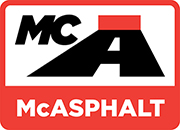Rejuvenating Seals
A rejuvenating seal consists of a single application of a rejuvenating emulsion on an existing aged-road surface to restore the chemical balance at the surface and some small depth below.
Design Criteria
When designing a rejuvenating seal a number of factors have to be examined and assessed to ensure a proper surface will be placed that will perform for its service life (5 years). The following factors can have a tremendous effect on the performance of a rejuvenating seal; traffic, aggregate shape, existing surface and residual rejuvenating agent content. If these factors are addressed the chances of a good seal being placed are greatly increased.
Traffic:
The type and quantity of traffic will have a large effect on the amount of rejuvenating emulsion to be used as well as the need for sand.
Aggregate Shape:
If an aggregate is needed to inhance surface friction then a sharp clean sand would be required.
Existing surface:
The texture and condition of the existing road surface will affect the aggregate if needed, quantity and spray rate. A dry porous road surface may need a higher quantity of emulsion.
Rejuvenating Agent Residual in the Emulsion:
The quantity of rejuvenating agent residual in the emulsion can affect the quantity of emulsion needed. The lower the residual the higher the quantity of rejuvenating emulsion needed.
If these factors are taken into consideration in designing the rejuvenating seal then the chances of a successful seal are greatly improved. Typically a rejuvenating seal would require a diluted emulsion application rate of 0.2 – 0.4 l/m² and a sand cover aggregate quantity of 3 – 6 kg/m² if needed.
Materials
Rejuvenating Emulsion:
The rejuvenating emulsion is a water based product which combines water and a rejuvenating agent (such as a process oil) together with surfactants. These rejuvenating agents are very compatible with asphalt .
Performance Guidelines
In order to construct a proper well designed fog seal the following guidelines should be followed:
- Evaluate existing road surface
- Design a fog seal with aggregate to be used on job if needed
- Use a clean sand
- Ensure compatibility of aggregate(if needed) and emulsion
- Calibrate and inspect all equipment
- Follow proper construction techniques
- Use traffic control to protect seal
- Work only in weather suitable for type and grade of emulsion being used
